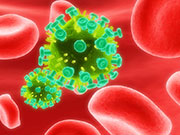HIV linked to increased risk for colorectum, lung, skin, and breast cancer independent of treatment
TUESDAY, June 16, 2015 (HealthDay News) — HIV-infected patients with cancer have increased cancer-specific mortality, according to a study published online June 15 in the Journal of Clinical Oncology.
Anna E. Coghill, Ph.D., from the National Cancer Institute in Rockville, Md., and colleagues examined the effect of HIV on cancer-specific mortality. Cases of 14 common cancers were identified in six U.S. states participating in a linkage of cancer and HIV/AIDS registries. Data were included for 1,816,461 patients with cancer, of whom 0.36 percent were HIV infected.
Compared to uninfected patients, the researchers found that HIV-infected patients had significantly elevated cancer-specific mortality for many cancers: colorectum (adjusted hazard ratio [aHR], 1.49), pancreas (aHR, 1.71), larynx (aHR, 1.62), lung (aHR, 1.28), melanoma (aHR, 1.72), breast (aHR, 2.61), and prostate (aHR, 1.57). For anal cancer, Hodgkin’s lymphoma, or diffuse large B-cell lymphoma, HIV was not associated with increased cancer-specific mortality. HIV remained associated with elevated cancer-specific mortality in non-AIDS-defining cancers: colorectum, lung, melanoma, and breast cancers (aHRs, 1.40, 1.28, 1.93, and 2.64), after further adjustment for cancer treatment.
“The elevation in cancer-specific mortality among HIV-infected patients may be attributable to unmeasured stage or treatment differences as well as a direct relationship between immunosuppression and tumor progression,” the authors write.
Copyright © 2015 HealthDay. All rights reserved.








